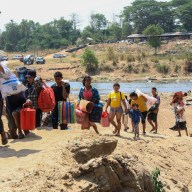In a place like Ottawa, a large-scale emergency seems unlikely, the city’s deputy mayor said yesterday.
But it could happen, said Diane Deans.
Things like power outages, winter storms, infectious disease, water contamination, hazardous chemical releases and earthquakes are possible, she said. “And the 1998 ice storm and 2003 blackout (is proof) that Ottawa is not immune,” she said.
Although Deans said the city is “ready to respond to natural disaster, industrial or environmental accidents and even a terrorist attack,” emergency preparedness is also residents’ responsibility, she said.
By helping themselves during an emergency, residents here can help the city, emergency workers said.
The city launched its annual emergency preparedness week yesterday, gathering members of the Ottawa police, paramedic service, fire department and Salvation Army to share information with the public.
Emergency preparedness is like an insurance policy, said Nathalie Rochefort, community emergency management co-ordinator with the city’s office of emergency management.
Rochefort’s department works with community groups and leaders to ensure they have plans in place in case of an emergency.
What Ottawa residents can do is simple, said Rochefort — be prepared, pack an emergency kit and tell your neighbours to do the same.
Philippe Geoffrion, a field officer for Emergency Management Ontario, recommends that families keep kits with clothes, blankets, enough food and water for 72 hours, a flashlight and a crank radio and have it at the ready.
“Most of these things, people have at home,” he said. “It’s about getting it all together.”
















